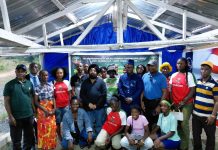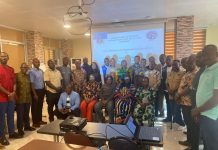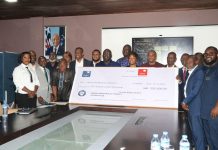
Africa-Press – Liberia. Rights and Rice Foundation (RRF) Liberia, has officially launched its natural resource project under the theme “Strengthening Concession Affected Communities to monitor extractive industries and achieve equitable benefit around three concessions in western Liberia, namely, Bea Mountain Mining Corporation, Mano Oil Palm Industries and Indo African Plantation Inc.”
The project which is sponsored by the Open Society Initiative for West Africa (OSIWA), based in Freetown, is expected to be implemented within 15 communities in Bomi, Grand Cape Mount, and Gbarpolu Counties.
The project seeks to support these affected communities receive an equitable benefit sharing from natural resources revenues through training and advocacy.
Providing an overview of the project which has a one-year implementation duration on Wednesday, September 29, Rights and Rice Foundation Project Coordinator Moses B. Kollie said about 70 percent of Liberians lived precariously between development, conservation and the law, and as such, the need to strengthen the capacity of community members in understanding the companies’ obligations and the community’s responsibilities is essential.
He said the government Pro-Poor Agenda encourages foreign direct investment as a way of supporting economic development. However, such investments have the mean to undermine local community customary rights to land, natural resources, and the locals’ ways of life if not managed well.
“History has shown that past investments have excluded host communities from participating in the process of awarding these investments which end out disposing them from their ancestral lands and depriving them of their benefits,” Mr. Kollie said.
He further noted that these investments are characterized by social and environmental issues ranging from deforestation, land degradation, labor abuses, and violent conflict, that further increases impoverishment and growing inequity within the local community.
Kollie said, there are laws that frown against such violation of community rights, but there are no traces of penalties by the government against these companies that are engaged in such.
Such trends are exacerbated by government and concessions lack the effective will in recognizing and implementing a range of people’s and local communities’ rights laws standard that promote equitable and sustainable management of land, environment and natural resources management.
He said: “Ironically, to strengthen natural resources management, Liberia has developed policies and adopted many international laws and conventions.”
However, he said the project will support the total direct beneficiaries of 750 affected community members, various community structure that lived on the fringes of mining, logging and agriculture concessions in Western Liberia as well as local authorities and civil society organizations/community based organizations to understand and monitor companies’ sustainable obligation in line with laws and international standards on land, mining, agriculture and forestry development.
Additionally, he stated that this will build their capacities in various national and international instruments that protect community rights to land and natural resources as well as sustainable natural management.
As part of the project Kollie, said RRF is expected to set up community based monitoring teams to monitor companies’ compliance to key instruments in cognizance of environmental and social safe guards. Additionally, he noted that project will support communities through training and logistics to track income from natural resources extraction by collaborating with partners such as Liberia Extractive Industry Transparency Initiative (LEITI) and support community members’ representation at county settings. He believes these approaches will give affected communities the followings benefits to build community members capacity to advocate for their rights, Support communities get the fair share of the revenue incomes, reduce conflicts between the communities and the concessions, put the various laws in practice and give the communities alternative for redress when their rights have been violated.





